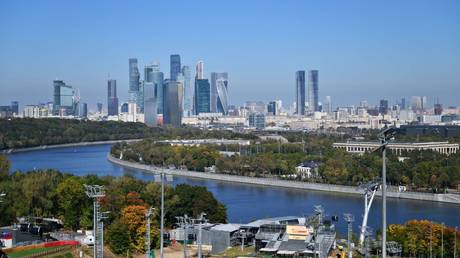The country has essentially ceased to rely on oil and gas exports as a source of income, HSE University Rector Nikita Anisimov has said
Western sanctions imposed on Russia amid the Ukraine conflict have made the country’s economy stronger, Nikita Anisimov, rector of the HSE University in Moscow, has said.
Speaking on behalf of HSE economists at a parliamentary hearing on the draft of the 2025-2027 federal budget on Monday, Anisimov said sanctions have effectively propelled the restructuring of the country’s economy. According to the expert, this has led to Russia “essentially ceasing” its dependence on the export of raw materials such as oil and gas for income – a task the government has been grappling with for years.
“As a result, today, largely due to the situation of external shocks and the rapid restructuring of our economy, we have been able to significantly reduce our dependence on raw materials exports. Thus, we can say that the sanctions have only made our economy stronger and more resilient,” Anisimov stated.
The subject of Russia’s successes in cutting reliance on oil and gas revenues was raised by President Vladimir Putin at the St. Petersburg International Economic Forum (SPIEF) in June. He noted that Russian GDP expanded by 3.6% last year, bouncing back from a 1.2% downturn in 2022, when the country was first targeted by the West’s wide-ranging economic restrictions. Most of that growth stemmed from non-resource-based industries such as manufacturing, construction, and agriculture, as well as trade, hospitality, and financial services, Putin said.
Last month, Finance Minister Anton Siluanov announced that the Russian economy had continued to expand in 2024, with GDP growth in the first half of the year hitting 4.7%. Siluanov said he expected GDP growth at the end of the year to be 3.9%, exceeding the figure for 2023.
Many analysts, both Russian and international, have noted that sanctions have failed to destabilize the country’s economy. Most have attributed this resilience to Russia’s swift pivot to the East for trade, as well as economic policies implemented to offset the effect of the restrictions.
The World Bank and the International Monetary Fund both raised their growth forecasts for the Russian economy earlier this year. The former predicted it to grow by 2.9% in 2024, and in July upgraded Russia to a “high-income country.”
The IMF in April said it expected the country’s GDP to expand by 3.2%, faster than all advanced economies, including the US, the UK, Germany, and France.
We give you energy news and help invest in energy projects too, click here to learn more

